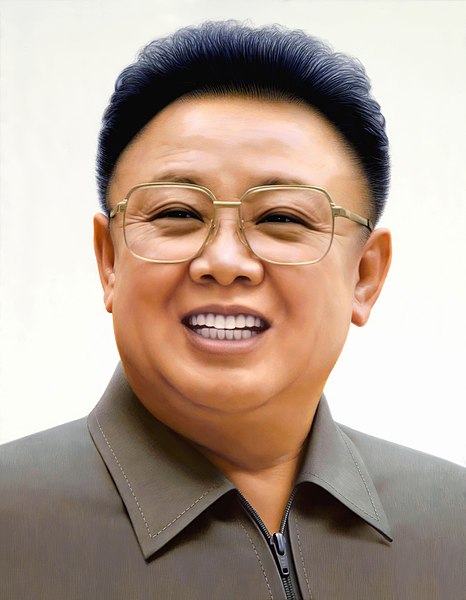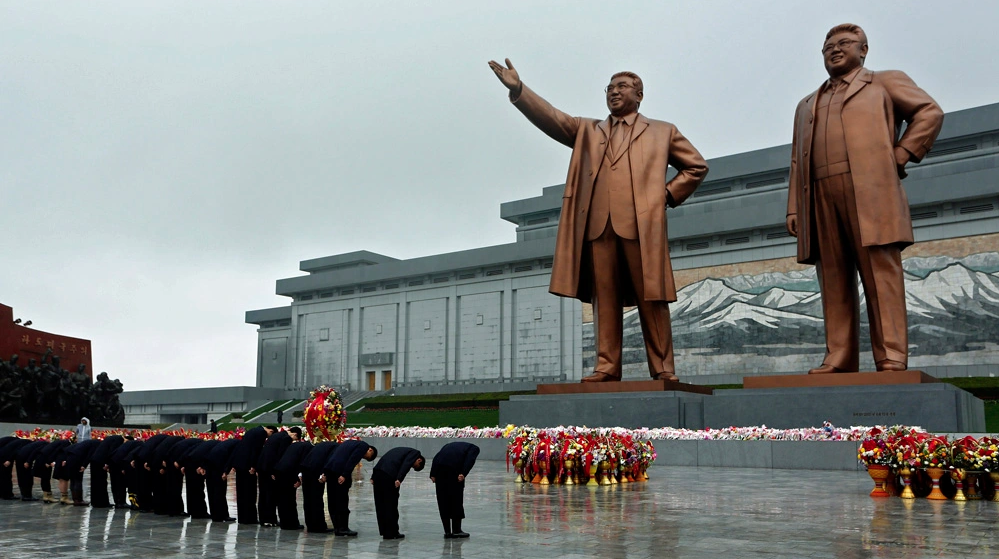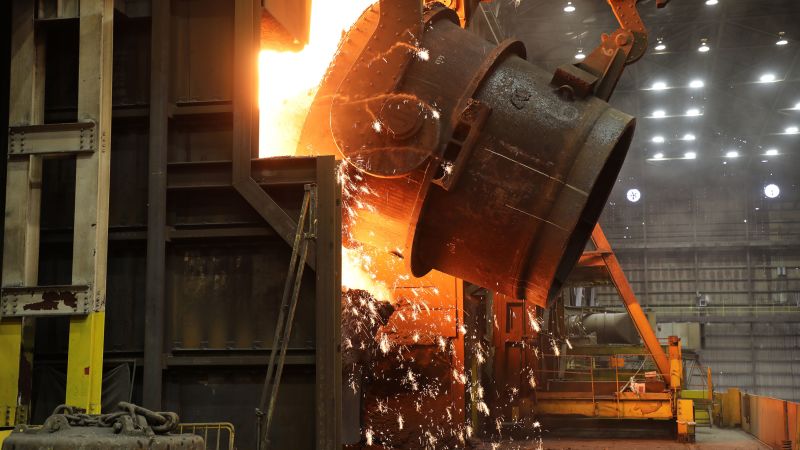JucheBot1988
Kimilsungist-Kimjongilist.
- 82 Posts
- 849 Comments

 10·8 months ago
10·8 months agoa lot of liberals tend to believe exactly that whatever you read will automatically program you
Basically admitting that they’re passive consumers of propaganda, and that they apply this mindset to everything. Which is a massive self-own, given that liberals are usually the ones trying to lecture everyone else on “bias” and the importance of “critical thinking.”

 18·8 months ago
18·8 months agoNow I’m inspired to write an article on “Putin the Joseph Smith-ite” or “Putin the Neo-Platonist” and submit it to a conservative journal.

 27·8 months ago
27·8 months agoMao Zedong, whom Putin surely read
Here we have the usual conservative anti-intellectualism on full display. If you are a statesman, you should be well read, especially in political theory; and if you are at all serious, you will have read authors whom you disagree with. Having read Mao doesn’t make Putin a Maoist, any more than Stalin having read John Locke makes him a liberal. Many of us here have read authors like Julius Evola and Mueller van den Bruck in order to better understand the fascist position – does that mean we’re about to emigrate, join a mercenary group, and Slava Ukraini ourselves into Kinzhal-induced oblivion? Of course not.
But this is how we Americans get politicians and public figures who, apparently out of some desire not to be tainted by Evil Commie Ideas, have read Democracy in America (final chapter only) and nothing else.
The liberal dream is for a black man to be brutally beaten to death by cops, but on Martin Luther King Street, not Bedford Forrest Avenue.

 2·8 months ago
2·8 months agoHadn’t heard of it – will check it out! Thanks for the rec.
Yep. Even just the atmosphere of certain places.
LA, for instance, has the strangest “feel” of any major city I’ve been in. Did even in the early 2000s when it wasn’t quite so run down and a bigger percentage of the population wasn’t homeless.
There’s something so indescribably Reddit about everything the Economist puts out.
Here’s one explanation I’ve heard, that I think makes a certain amount of sense. The United States can walk away from this war tomorrow, with its reputation as a great power intact; in fact, not having any more of its advanced weaponry blown up by the Russian orc Asiatic Hordes would go a long way toward preserving whatever international prestige the US military still has. Naturally, it would be a major geopolitical setback for Washington, and for the Democrats a political disaster. But it would not mean in any way the end of American global power. (The war itself actually undermines American power, and there may be a few people in the state apparatus who can see it – one or two high-place individuals who aren’t totally drunk on their own propaganda of the US as some unstoppable military and economic juggernaut).
The UK, on the other hand, wants to be seen as a great power, and this is a reputation they can very much lose. Defeat in Iraq and Afghanistan created demoralization at home, and a sense abroad that the UK was militarily and on the world stage basically inconsequential; which latter was especially galling, given that Americans already tend to view the UK as a colony (American talk of “our valued partners in London” has been for the past fifty years mostly a sop to British feelings). Nor did Brexit create some kind of prosperous, internationally significant “third bloc” distinct from both the US and the EU; the country has been going downhill economically, and its domestic politics have been even more overshadowed by Washington. Thus Ukraine becomes for the UK’s government a kind of last-ditch military adventure meant to salvage their reputation on the world stage. It is a war against the old enemy, Russia; and it will, if successful, show the superiority of the neoliberal order over the controlled, neo-Soviet economy Russia is supposed to be. But the war is very much not succeeding, and the UK is thus compelled to throw more money and equipment – and huge numbers of Ukrainians, not that they care about this – into a bottomless pit.
I live there, and “weird” doesn’t begin to describe it.

 7·8 months ago
7·8 months agoThis smells like concessions to avoid larger inconveniences to me.
That’s exactly what it is, and it’s not new. It might seem paradoxical, but the very wealthiest capitalists – the movers and shakers of the entire ruling class – are often less concerned about day-to-day profits than maintaining the stability of the system. This is because their wealth is so bound up with the entire system, and if it collapses, they do too; hence they are often willing to countenance “progressive” reforms, especially if they can so swing it that other capitalists lower down the ladder of wealth are the ones footing the bill. This is sometimes referred to as capital taking on a “managerial” mindset. Examples of it are DuPont supporting the creation of the Federal Reserve, the Rockefellers supporting Roosevelt, and so on. This creates tensions, of course, within the ruling class, as less wealthy capitalists (whose business empires will often shrink) resent the restrictions which high-level capital is forcing on them, and seek to throw off the imposed restraints.
Glad I could help! It was sort of an epiphany that came to me yesterday, I don’t know why, while I was reading a NYT editorial.
Yes, that is a more accurate way to put it. Liberals are not the subtlest of individuals, and their critiques have all the precision of a US airstrike. Thanks for the constructive criticism!

 2·8 months ago
2·8 months agothe destruction of the empire and capitalist status quo will be to the benefit of even imperial cores’ citizenry (as someone living in a western country myself).
As Engels put it: “A nation cannot be free and at the same time continue to oppress other nations.” It sounds idealistic and dewy-eyed, but even the most cursory look at history shows he was right.

 5·8 months ago
5·8 months agoModern Russia is not progressive in social terms.
This is completely true, from everything I’ve seen and heard. What I probably should have said (noted this below as well in reply to ComradeSalad) is that Russia plays, on the world stage, an imperfectly progressive role.
Old Russians are communistic and dead , middle aged Russians are chauvinists and anti commies and younger generations are pro west completely and despise everything about USSR.
I’ve heard this varies by region? I.e., in big cities like Moscow and St. Petersburg there is a huge liberal contingent, and a lot of anti-Soviet feeling. But in the “hinterlands” you find, among all ages, a much more positive view of the USSR, and more people will describe themselves as “communist” in their politics (whether or not they have a very clear idea of what that means). I haven’t been to Russia, so I’m going entirely off hearsay, but it’s a huge country with a lot of room for local variation.
I will say Putin as a whole is responsible for bringing back Russia from death.
This I would push back against a little, as being somewhat un-materialist. One should not deny the important role Putin has played. But history is not made by individuals, and Putin has been able to achieve what he has because he has the backing of an important strata of Russian society: the security services and the mid-level bureaucrats who see to much of the day-to-day running of the country. Though not communist in any real ideological sense, these people have tended to have a deep-set patriotism, and they emerged from the 1990s very angry, and rightfully so, at the west what it had done to Russia. Putin, I think, came to power with the support of this class – i.e., he is what Marx would have called a “bonapartist,” a leader who represents one faction of the ruling class seizing power to suppress another faction. I believe Zyuganov described him in exactly these terms soon after he was elected.

 5·8 months ago
5·8 months agoGood clarification. The better way to think about it is probably that Russia plays. on the level of international relations, an imperfectly progressive role. Everything you’ve said about internal affairs in Russia seems true, and is echoed by comrades living in Russia.

 3·8 months ago
3·8 months agoReread, and you’re right. My apologies.

 81·8 months ago
81·8 months agoThis is, unfortunately, just the ugly result of complete societal collapse. US capital destroyed Russia in the 1990s, and the country has still not fully recovered. Look at Ukraine for an even more dramatic example: in just 23 years, it went from a socialist republic to a state ruled by a genocidal and openly fascist government. That modern Russia is as imperfectly progressive as it is is honestly something of a miracle.

 4·8 months ago
4·8 months agomost already deserved to be destroyed for the benefit of all humanity, even including their citizenry and certainly their non-white citizenry
I’d be careful here, comrade. Not only is calling for the mass death of civilians un-Marxist, it tends to get noted by the feds, who will then trot it out as an “extra” the next time you’re brought in on a technicality. An older communist told me once, never even joke about illegal activity if you’re engaged in activism, because it provides a pretext for them to build a case against you as a terrorist. You’re useless to the global south behind bars.
It can also sow division and distrust in the movement, because statements like this are often said by feds as bait. (Not saying you are a one – that’s an insult I’d never give a person without cause – but be aware).

 23·8 months ago
23·8 months agoPinkwashing and its consequences.






“We are now moving at about three and a half times the typical speed of an Amtrak transcontinental, and about twice its occasionally-reached top speed.”